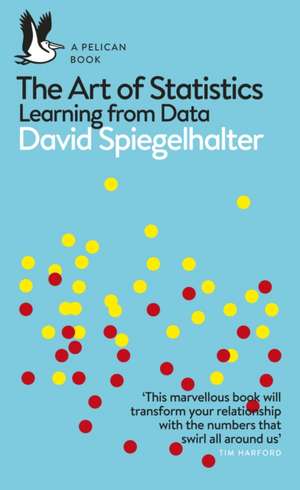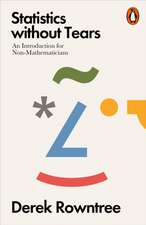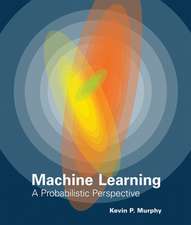The Art of Statistics: Learning from Data: Pelican Books
Autor David Spiegelhalteren Limba Engleză Paperback – 3 feb 2020
'Required reading for all politicians, journalists, medics and anyone who tries to influence people (or is influenced) by statistics. A tour de force'Popular Science
Do busier hospitals have higher survival rates? How many trees are there on the planet? Why do old men have big ears?David Spiegelhalterreveals the answers to these and many other questions - questions that can only be addressed using statistical science.
Statistics has played a leading role in our scientific understanding of the world for centuries, yetwe are all familiar with the way statistical claims can be sensationalised, particularly in the media. In the age of big data, as data science becomes established as a discipline, a basic grasp ofstatistical literacy is more important than ever.
InThe Art of Statistics,David Spiegelhalter guides the reader through the essential principles we need in order to derive knowledge from data.Drawing on real world problems to introduce conceptual issues, he shows us how statistics can help us determine the luckiest passenger on the Titanic, whether serial killer Harold Shipman could have been caught earlier, and if screening for ovarian cancer is beneficial.
'Shines a light on how we can use the ever-growing deluge of data to improve our understanding of the world'Nature
| Toate formatele și edițiile | Preț | Express |
|---|---|---|
| Paperback (2) | 58.97 lei 24-30 zile | +21.79 lei 4-10 zile |
| Penguin Books – 3 feb 2020 | 58.97 lei 24-30 zile | +21.79 lei 4-10 zile |
| BASIC BOOKS – 17 aug 2021 | 121.85 lei 3-5 săpt. |
Din seria Pelican Books
-
 Preț: 82.44 lei
Preț: 82.44 lei - 16%
 Preț: 58.85 lei
Preț: 58.85 lei - 17%
 Preț: 57.40 lei
Preț: 57.40 lei - 17%
 Preț: 57.80 lei
Preț: 57.80 lei - 16%
 Preț: 53.42 lei
Preț: 53.42 lei - 28%
 Preț: 60.02 lei
Preț: 60.02 lei - 17%
 Preț: 57.39 lei
Preț: 57.39 lei - 17%
 Preț: 52.43 lei
Preț: 52.43 lei - 18%
 Preț: 56.71 lei
Preț: 56.71 lei - 16%
 Preț: 69.34 lei
Preț: 69.34 lei - 16%
 Preț: 58.12 lei
Preț: 58.12 lei - 16%
 Preț: 69.51 lei
Preț: 69.51 lei - 16%
 Preț: 58.18 lei
Preț: 58.18 lei - 16%
 Preț: 58.76 lei
Preț: 58.76 lei - 16%
 Preț: 80.51 lei
Preț: 80.51 lei - 16%
 Preț: 69.91 lei
Preț: 69.91 lei - 16%
 Preț: 53.42 lei
Preț: 53.42 lei - 16%
 Preț: 58.81 lei
Preț: 58.81 lei - 33%
 Preț: 50.42 lei
Preț: 50.42 lei - 33%
 Preț: 50.06 lei
Preț: 50.06 lei - 16%
 Preț: 69.26 lei
Preț: 69.26 lei - 16%
 Preț: 58.32 lei
Preț: 58.32 lei - 16%
 Preț: 68.72 lei
Preț: 68.72 lei - 16%
 Preț: 58.50 lei
Preț: 58.50 lei - 16%
 Preț: 58.40 lei
Preț: 58.40 lei - 19%
 Preț: 57.42 lei
Preț: 57.42 lei - 17%
 Preț: 57.36 lei
Preț: 57.36 lei - 21%
 Preț: 133.01 lei
Preț: 133.01 lei - 17%
 Preț: 57.94 lei
Preț: 57.94 lei - 17%
 Preț: 57.78 lei
Preț: 57.78 lei - 27%
 Preț: 69.83 lei
Preț: 69.83 lei - 17%
 Preț: 56.98 lei
Preț: 56.98 lei - 22%
 Preț: 130.34 lei
Preț: 130.34 lei - 17%
 Preț: 57.93 lei
Preț: 57.93 lei - 16%
 Preț: 69.06 lei
Preț: 69.06 lei - 18%
 Preț: 50.78 lei
Preț: 50.78 lei - 22%
 Preț: 130.65 lei
Preț: 130.65 lei - 16%
 Preț: 117.52 lei
Preț: 117.52 lei - 17%
 Preț: 58.03 lei
Preț: 58.03 lei -
 Preț: 69.94 lei
Preț: 69.94 lei - 17%
 Preț: 57.87 lei
Preț: 57.87 lei - 16%
 Preț: 68.94 lei
Preț: 68.94 lei - 21%
 Preț: 55.83 lei
Preț: 55.83 lei -
 Preț: 126.65 lei
Preț: 126.65 lei
Preț: 58.97 lei
Preț vechi: 70.07 lei
-16% Nou
11.29€ • 12.26$ • 9.49£
Carte disponibilă
Livrare economică 03-09 aprilie
Livrare express 14-20 martie pentru 31.78 lei
Specificații
ISBN-10: 0241258766
Pagini: 448
Dimensiuni: 111 x 181 x 25 mm
Greutate: 0.26 kg
Editura: Penguin Books
Colecția Pelican
Seria Pelican Books
Locul publicării:London, United Kingdom
Notă biografică
Recenzii
There is something in here for everyone... A call to arms for greater societal data literacy ... Spiegelhalter's work serves as a reminder that there are passionate, self-aware statisticians who canargue eloquently thattheir discipline is needed now more than ever.
Shines a light on how we can use the ever-growing deluge of data to improve our understanding of the world. . .The Art of Statisticswill serve students well. And it will be a boon for journalists eager to use statistics responsibly - along with anyone who wants to approach research and its reportage with healthy scepticism.
What David Spiegelhalter does here is provide avery thorough introductory groundingin statistics without making use of mathematical formulae. And it'sremarkable. Spiegelhalter iswarmandencouraging- it's a genuinely enjoyable read ... This bookshould be required reading for all politicians, journalists, medics and anyone who tries to influence people (or is influenced) by statistics. Atour de force.
The Art of Statisticsis in thegreat educational traditionof its publishing imprint, Pelican Books: an attempt to get everyone up to speed with the practical uses of statistics, without pages of terrifying equations or Greek letters. In a series ofspry, airy chapters, he succeeds fabulously... Lucid and readable. In an age of scientific clickbait, 'big data' and personalised medicine,this is a book that nearly everyone would benefit from reading.
Important and comprehensive
This is anexcellentbook. Spiegelhalter isgreat at explainingdifficult ideas . . . Yes, statistics can be difficult. But much less difficult if you read this book.
Like the fictional investigator Sherlock Holmes, Spiegelhaltertakes readers on a trail to challenge methodology and stats thrown at us by the media and others. But where other authors have attempted this and failed, he isinventive and cleverin picking the right examples that spark the reader's interest to become active on their own.
Do you trust headlines telling you . . . that bacon, ham and sausages carry the same cancer risk as cigarettes? No, nor do I. That is whywe need a book like thisthat explains how such implausible nonsense arises in the first place. Written by amaster of the subject. . . this booktells us to examine our assumptions. Bravo.
Descriere
'This marvellous book will transform your relationship with the numbers that swirl all around us. Read it and learn. I did' Tim HarfordStatistics has played a leading role in our scientific understanding of the world for centuries, yet we are all familiar with the way statistical claims can be sensationalised, particularly in the media.
In the age of big data, as data science becomes established as a discipline, a basic grasp of statistical literacy is more important than ever. In The Art of Statistics, David Spiegelhalter guides the reader through the essential principles we need in order to derive knowledge from data. Drawing on real world problems to introduce conceptual issues, he shows us how statistics can help us determine the luckiest passenger on the Titanic, whether serial killer Harold Shipman could have been caught earlier, and if screening for ovarian cancer is beneficial.
How many trees are there on the planet? Do busier hospitals have higher survival rates? Why do old men have big ears? Spiegelhalter reveals the answers to these and many other questions - questions that can only be addressed using statistical science.





















